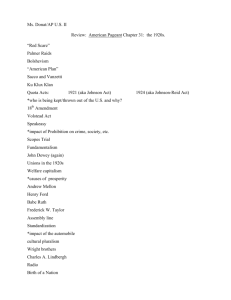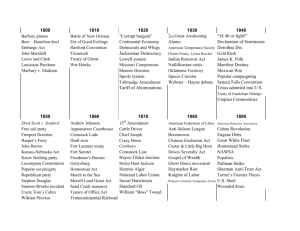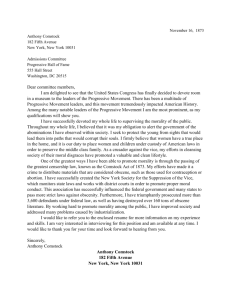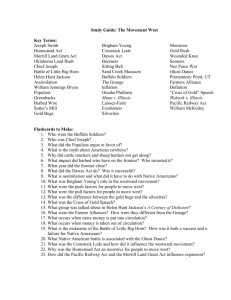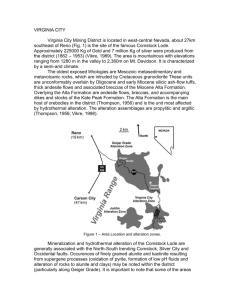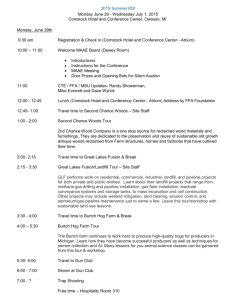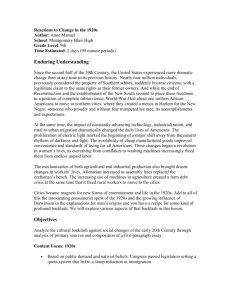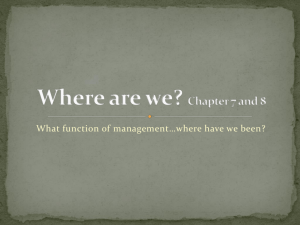Comstock Laws
advertisement
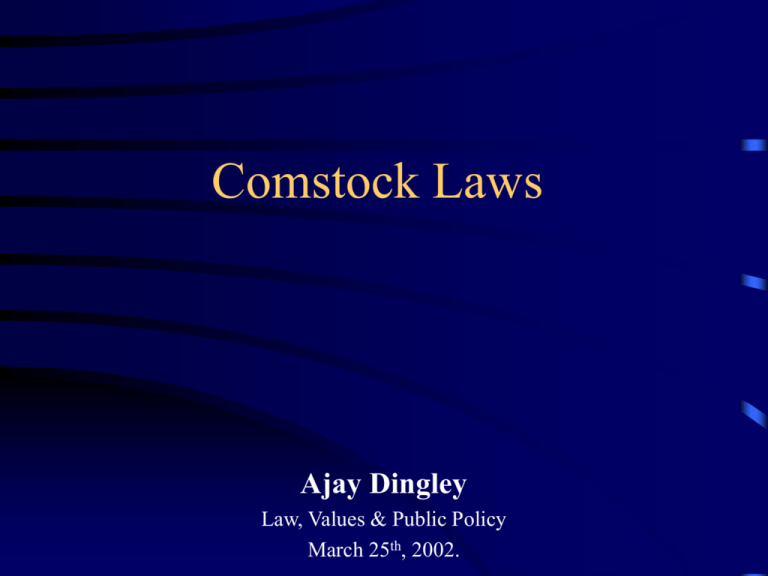
Comstock Laws Ajay Dingley Law, Values & Public Policy March 25th, 2002. Overview • • • • • • Anthony Comstock Why the laws came about Comstock Act Role of Interest Groups Conflicts of various nature Take away lessons Anthony Comstock • Self-appointed anti-vice crusader • In 1873, anti-obscenity statute forbade the importing or mailing of information about abortion or contraception • Many state legislatures followed in NY footsteps (1844-1915) Source: http://www.plannedparenthood.org/about /photoalb/COMSTOCK.HTM • By late 19th century, contraception became unmentionable -- even in major medical textbooks Comstock’s role • 1st foray against obscenity in 1868 • A friend of his was “led astray and corrupted and diseased” – I.e. friend bought an obscene book, went to a brothel and contracted a venereal disease • Bought books from dealers and got police to arrest them Comstock Act • In 1873, Comstock Act passed by Congress, reads as follows: That no obscene, lewd, or lascivious book, pamphlet, picture, paper, print, or other publication of an indecent character, or any article or thing designed or intended for the prevention of contraception or the procuring of abortion, nor any article or thing intended or adapted for any indecent or immoral use or nature, nor any…book, pamphlet, advertisement or notice of any kind giving information, directly or indirectly, were, or how, or of whom, or by what means either of the things before mentioned may be obtained or made… shall be carried in the mail, and any person who shall knowingly deposit, or cause to be deposited, for mailing or delivery, ,any of the herein-before-mentioned articles or things, or any notice, or paper containing any advertisement relating to the aforesaid articles or things… shall be deemed guilty of a misdemeanor. Aftermath of Comstock Act • Congress appoint Comstock as U. S. Post Office Inspector in 1873 • He destroyed 160 tons of literature & brought 3,760 "criminals" to "justice" during these years Groups supporting Comstock • Young Men’s Christian Association (YMCA) • NY Society for the Suppression of Vice (NYSSV) • American Medical Association (AMA) • Physicians • Church YMCA’s effort • Not indifferent to obscenity corrupting the youth • 1868: YMCA secured a NYS law that restricted the circulation of obscene material • 1872: YMCA heard about A. Comstock. They decide to support his crusade. Morris Jesup founded the Committee for the Suppression of Vice within YMCA which secretly sponsored his activities. • 1874: Committee separates to become NYSSV – Thus becoming law enforcement body AMA and physicians’ interests • AMA criminalized abortion – women were being “unnaturally selfish and ruthless” • N.F. Cook wrote about contraception being an unnatural act – a sin • Published “Satan in Society” (1878), mentioning acceptable ways of avoiding pregnancy such as “doubtful propriety” • “All other ways means of prevention of offspring are disgusting, beastly, positively wrongful, as well as unnatural, and physically injurious.” Interest of The Church • Influence of the Church in America was declining because of Robert G. Ingersoll - “The Great Agnostic” because of his unreligious views • Ingersoll waged relentless war against the Church • The Church feeling its power going from it, grasped at the "Comstock laws." Comstockery (cont’d) • Comstock laws designed to aid and abet both moral and religious prejudice and persecutions • This aroused wrath of the free-thinking & liberty- loving populace • In 1878, petition presented to Congress, by Ingersoll signed by 70,000 "freemen," requesting the repeal of these outrageous laws • Petition passed and the law was revised, removing the interference of religious prejudice Comstock’s perseverance • The moral interference was left and Anthony Comstock thus became the official guardian of American morality • He did not invoke prostitution or marital infidelity to make his case against contraception • He equated contraception with corruption of children’s morals and pollution of the home was predicated on already existing discourse that linked contraception to moral impurity Margaret Sanger • In 1912, she began a campaign to publicize accurate sexual information that ultimately led to the first breaches in the law • Campaign started with two articles for the New York Call. "What Every Mother Should Know," ran without difficulty. The second article, "What Every Girl Should Know," riled Comstock so much that the issue was barred from the mails • The next issue of the newspaper carried the notice, "What Every Girl Should Know: 'NOTHING! By Order of the Post Office Department.'" Breakdown of Comstock laws • Comstock disliked Sanger's accurate discussion of venereal disease and her use of words like gonorrhea • Sanger took different paths toward accomplishing the same goal • She sought state and federal laws to protect doctors who discussed birth control with their patients. Both efforts moved forward in the 1920's, with Mary Dennett's program apparently achieving the major success • Sanger did get legislation protecting the medical discussion of birth control introduced in Congress and in some state legislatures • By mid-1930's, Comstock laws were no longer being used to bar the dissemination of birth control information • No proof existed that physicians encountered legal difficulties if they prescribed birth control devices • Supreme Court finally entered the battle in the late 1960's by ruling that the dissemination of information about birth control was a permissible First Amendment activity with which neither the state nor federal government could interfere Closing remarks • In asking federal, state, and local governments to take action against sexually explicit material, Americans are requesting intervention in the most private areas of family life -- the right to inculcate in their children the moral values that they wish to pass on • Legal battles are social events • Legal system reflects social and political events of our time References • Beisel, Nicola. 1997. Imperiled Innocents: Anthony Comstock and Family Reproduction in Victorian America • “The Comstock Laws”, American Socialist, 4 April 1878, p.108 http://www.binghamton.edu/~womhist/oneida/doc24. htm last accessed March 25th, 2002 • Sanger, Margaret. 1915. Comstockery in America. http://www.nyu.edu/projects/sanger/comstock.htm last accessed March 25th, 2002
